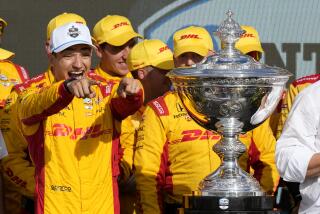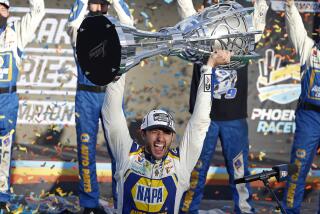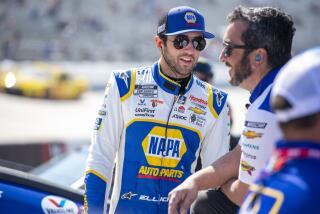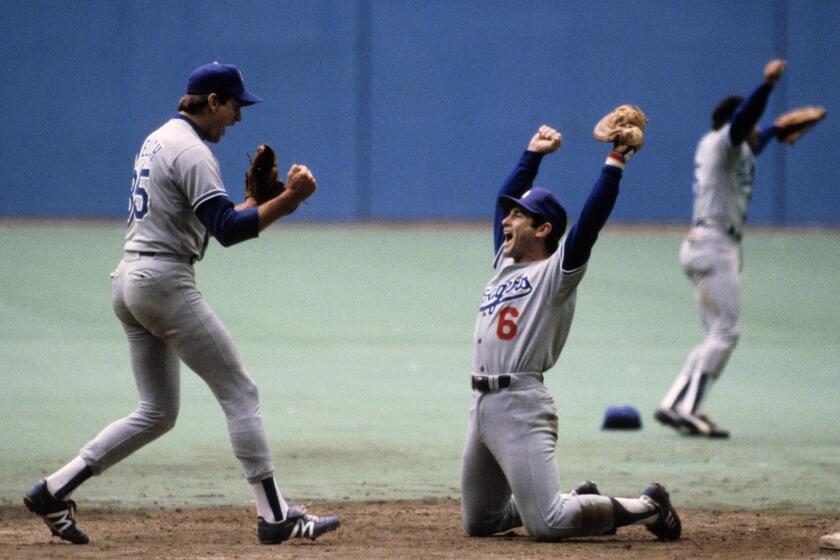‘King’ sees changing of the guard
Before NASCAR became one of America’s most popular sports with national expansion and Fortune 500 sponsors, stock-car racing for many fans boiled down to one driver: Richard Petty.
He’s simply called “The King,” owing to his 200 victories in a career that spanned from 1958 to 1992. It’s a record unlikely to be broken because the sport is much more competitive today. No current driver has half that number of wins.
Petty recently turned 71, but he never seems to change much: Tall, lanky, with his signature cowboy hat, wrap-around sunglasses, ever-present grin and his unwavering willingness to sign autographs and pose for pictures with fans.
But much has changed. Petty and his family recently sold control of their team -- which struggled since Petty stopped driving -- to the investment firm Boston Ventures. Petty had little choice; he needed the cash to stay competitive in today’s NASCAR.
Tonight, when the NASCAR Sprint Cup series races at Chicagoland Speedway, it will be 50 years since Petty’s first race. Petty -- son of Lee Petty, one of NASCAR’s early driving greats -- drove a 1957 Oldsmobile in NASCAR’s old Convertible Division at Columbia (S.C.) Speedway. He finished sixth.
Petty recently spoke to The Times about that day and what has happened since:
Question: What do you remember about that first race?
Answer: It was Thursday night. The reason they run on Thursday night in South Carolina was they had an Army base down there and they paid [the soldiers] on Thursday night.
Q: Did you know you wanted to be a driver?
A: I knew I wanted to try. I’d never done it. I’d been going [to races] since I was 11 years old, so I knew how the program worked. I’d done everything there was as far as working on the car. We run the race and I told Dale [Inman, his cousin and future crew chief], “You know, I think I’m going to like this.”
Q: Did you talk to your dad after the race?
A: I talked to him before. Basically he said, “Just don’t drive over your head.”
Q: NASCAR has changed so much since then. What’s one change you like, one you don’t like?
A: The big thing that’s changed is there’s a lot of money in it. The big thing I don’t like is there’s too much money in it.
Now it’s so technical . . . the teams got so big. But it’s a necessary evil; it needs to do that for us to grow. It couldn’t stay like what it was 20 years ago or five years ago. It has to change to keep up with what the market wants to sell.
Q: What was it like before?
A: You lived off the purse. Sponsorship didn’t come about until 1971-72. Up until that time you lived off what you made at the race track. We were the first ones to have a nationwide sponsor with STP.
Q: Skirmishes between drivers, on and off the track, are a big part of NASCAR’s appeal today. How prevalent was it in your day?
A: There’s not near as much of it goes on now as what used to go on. The [TV] cameras are catching it now. There wouldn’t have been enough cameras [before].
Over a period of time society’s kind of cleaned it up. Instead of having 5,000 people [attend a race] we’ve got 105,000 [and] the big deal is sponsors. You can’t have a sponsor and then be hitting somebody with a jackhammer or something.
Q: But you always seemed to keep smiling after a race no matter the outcome. How did you handle disputes with other drivers?
A: If I had a problem with you, I come and said something about it and I walked off. That was it. I wasn’t there for you to make an excuse or for me to make an excuse. I got it off my mind and the party was over.
Q: If you were in your 20s again, do you think you’d be successful as a driver in today’s NASCAR?
A: It’s hard to say; too hypothetical to even go there.
Q: It’s been estimated that you’ve signed more than 1 million autographs over your career. True?
A: I don’t know if I’ve signed that many. I’ve signed a bunch.
Q: Why is that important to you?
A: When I first went to the races, they might have 4,000 seats and when the race was over there might be 100, 150 [people] come down, so you signed autographs.
You didn’t have a sponsor or nothing, and they bought the tickets. If they didn’t buy a ticket, this guy who runs the track ain’t gonna pay me because he’s got no money. The fans give it to the promoter, and then the promoter gives it to me. These people walking around are the ones who pay the bills. Even if you’ve got a sponsor, [the fans] still got to buy your product or they don’t sponsor. Fans make it work.
Q: Your team struggled for years before selling to Boston Ventures. Why did you wait until now?
A: Stubbornness, I guess. We stayed in the same shop for 60 years. One of them deals where eventually you get hit upside the head enough times you finally feel it.
We played with this for the last five or six years, talked to a lot of people. We thought the Boston Ventures was the best fit of any that had come down the pike.
Q: You’ve said you’ll stay involved in the team. What does that mean?
A: As long as it’s got that [Petty] name on it, I’m going to be involved. Now if we change it to Joe Blow, I’m liable to say, “See ya’ll, guys.”
--
--
TONIGHT’S RACE
LifeLock.com 400, 5 p.m., TNT
More to Read
Go beyond the scoreboard
Get the latest on L.A.'s teams in the daily Sports Report newsletter.
You may occasionally receive promotional content from the Los Angeles Times.










